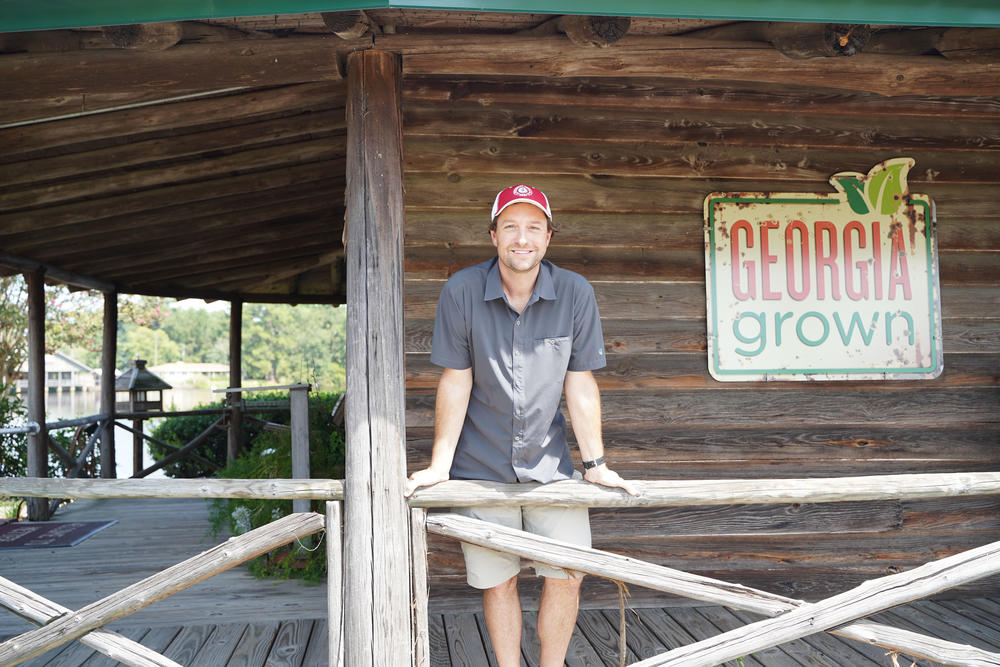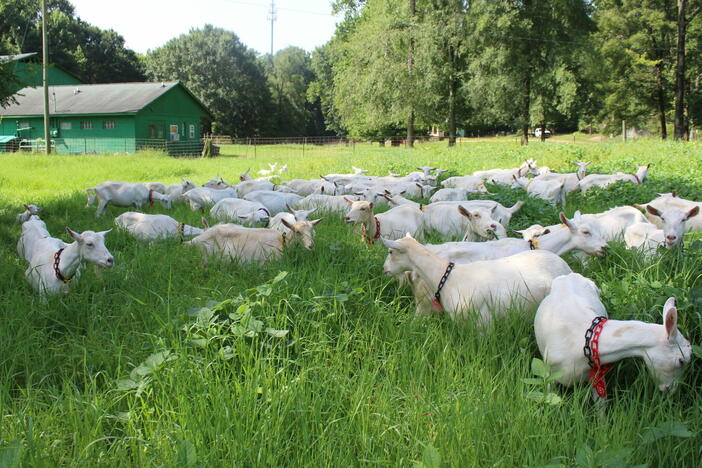
Section Branding
Header Content
A Fork in the Road Podcast: Season One Look-back Bonus Episode
Primary Content
Special bonus episode of the Fork in the Road podcast where we'll look back at the first season to tell some of the behind-the-scenes stories and answer a few questions from you.

(TRANSCRIPT)
David Zelski: My car right now has 149,000, and I'd say about 75% of that is Georgia Grown miles.
Jeremy Powell, GPB Senior Podcast Producer: Does Georgia really produce that many peanuts?
David Zelski: Actually. In fact, after this podcast aired, I think this one went national. This is a special bonus episode where we'll take a look back at the first season of Fork in the Road podcast to tell some of the behind the scenes stories and answer a few questions from you.
Theme Song: I came from the mud, there's dirt on my hands. Strong like a tree, there's roots where I stand.
David Zelski: I'm David Zelski, and this is the Fork in the Road podcast featuring the stories from Georgia's farmers, fishermen, merchants, artisans, chefs and others who help provide Georgia-grown products to folks in the Peach State and beyond. Today, we're in the GPB studios in Midtown Atlanta, just west of the 75/85 Connector, and right next door to the historic Silver Skillet. I am joined by senior podcast producer Jeremy Powell.
Jeremy Powell, GPB Senior Podcast Producer: And I have questions for you, David.
David Zelski: Okay.
Jeremy Powell, GPB Senior Podcast Producer: I have questions.
David Zelski: All right.
Jeremy Powell, GPB Senior Podcast Producer: So we have an email address, AForkInTheRoad@GPB.org and Mike in Rome writes, "I have a question about the episode about cotton sheets."
Brian Ponder, Southern Drawl: We knew from the start we were not going to make a Wal-Mart sheet. No offense to Wal-Mart. We were not going to make a cheap sheet. We had a consultant that we talked to and I wanted to know how can we make the sheet this better than anybody else's? He said that no one had ever made a 100% combed cotton sheet.
Jeremy Powell, GPB Senior Podcast Producer: "Do people really pay that much for a set of bed sheets?"
David Zelski: Of course they do. Of course they do. Okay, so think how much time — I remember a mattress salesman once told me you are going to want to pay for this mattress because the amount of your life that you spend on the mattress, whether it flies by or not. Same with the sheets. If you're going to sleep better, you're going to be a happier person. Right? So if you're sleeping in comfortable sheets instead of ones that cling to your body, these are softer. I mean, I felt them personally. They are soft sheets; almost left that day with a bunch of sheets because I just didn't have $200 in my pocket or whatever they cost, but they are worth it. So think about it. The amount of time that you're spending using these sheets, that's that's an easy sell for me.
Michael Brooks, Southern Drawl: We looked at having retail stores and it just we couldn't see where that was feasible at the time. And once online sales started going, a lot of stores, then it opened up that avenue for us. And so we've been — we've been fortunate and really excited about about the future of Southern Drawl.
David Zelski: Actually, in fact, after this podcast aired — I think this one went national — I got a call from Michael Brooks with Southern Drawl. He said, "David" — you know, in his Southern drawl, may I add — he said "David, has this story somehow been re-aired or gone national? Because we're getting a lot of phone calls." I don't know if those were his exact words, but he was amazed by what this podcast did. And it had been two years since the TV episode ran. And so this just rejuvenated talk for the business and, you know, selling these sheets. And it was great to hear from them. It it's always great when the farmers, merchants, artisans, chefs who we work with. When it when this show helps them, it it makes me feel good that we've done something.
Jeremy Powell, GPB Senior Podcast Producer: Because that's not your — you're, you're not promoting them to sell their products. You're just talking about their stories. And their stories are interesting and they're interesting people and they make interesting products. And if they sell more because of the show, I mean, that's a good thing.
David Zelski: Yeah, Yeah. We're not saying this is how people find them on their own. We're just sharing the story. And if you share a good story and it interests somebody, hey, you might sell a few sheets, and I guess that's what happened.
Jeremy Powell, GPB Senior Podcast Producer: Moving on. Kennedy in Cumming has a question about Bramlett Trout Farms.
Terry Bramlett, Bramlett Trout Farms: This land has been in my family for generations. I have great-great-great-grandparents buried here, and we were thrilled to get to come back here and earn a living raising trout. We've been raising trout for 40 years now. Started in 1980. We've raised our family here. It's a wonderful place to live.
Jeremy Powell, GPB Senior Podcast Producer: He mentioned live haul at the end, what does that mean?
Terry Bramlett, Bramlett Trout Farms: We work together well, and we always have. We enjoy our time together. And she does everything on the farm that I do. She kind of draws the line on the live haul. She doesn't like the water moving around in the tank in the back of the truck.
David Zelski: Live haul. I am guessing live haul would be moving the trout from one destination to another, keeping them alive. I mean, I guess the — when you're cooking a fish, you want to keep it alive as long as possible. You know, the best fish to not have a fishy taste as to, you know, have it out of the water, you know, two to 12 hours from when you're eating it. You know, if you go through this farm, you'll see different tanks. You'll see the the ones that are just starting. I think they're called fingerlings. You know, it sounds like potatoes. Forgive me if I'm wrong on the actual word, but they're small trout. But he has to separate the small ones from the less small ones and definitely separate the ones that are going to eat the smaller ones because trout eat other trout. That's just how it is. And so they have to transport them. And when you're transporting from one pond to another, you got to keep them in a tank and then they go out a chute. If you've ever been to a hatchery, it's much like that. These hatcheries, they they come in these tanks and then they dump them out in the hundreds, sometimes the thousands.
Jeremy Powell, GPB Senior Podcast Producer: Wow.
David Zelski: So if these chef are needing a bunch of rainbow trout, they can keep them live as long as possible. Kind of like when you would go to Red Lobster growing up, you'd see the live lobster. You want to keep it alive as long as possible because that's going to be your freshest fish. And you get a fresh Georgia-grown mountain rainbow trout. It's — it's going to be some of the best fish you've ever had. I think.
Jeremy Powell, GPB Senior Podcast Producer: I have a question from me. I wrote this one. No, But really, does Georgia really produce that many peanuts?
Brad Hardy, Hardy Farms Peanuts: But we actually produce about 10 million pounds of roasted peanuts through this facility every year.
David Zelski: Isn't that crazy? We're not the largest state. I guess we're the largest east of the Mississippi. But it is just a perfect climate for peanuts. And as we've learned through this podcast and the show, it's a generational thing. If your dad and grandpa taught you how to grow peanuts, you're going to learn from them. But then all these farmers are well educated, not through just history of their family, but, you know, they go to. I've talked to people who've gone to Cornell, Berkeley, UGA. These are the farmers. And so they're learning the traditions of their family mixed with technology and science that are cutting edge. And so you put that into peanuts where Georgia was already No. 1, and then they just learn to grow them better. They have a higher success rate. They know when to pull them. It's such a — a science, but also an intuition of when to pull the peanuts because they're underground. You know, you pull them out, you do a blast, you check to see if these few are ready, and then you're gambling that you're going to have a 70-80% success rate on these peanuts. So through tradition, through science, Georgia has been doing it right. And I think a lot of that is tradition mixed with the perfect climate that Georgia offers and a very large peanut growing area.
Jeremy Powell, GPB Senior Podcast Producer: That's something I didn't even think about, the fact that peanuts are underground, that you can't just go out and check them off of a tree or something. You — yeah, you got to pull it up.
David Zelski: Yeah. And once you pull, that's it. So let's say you're ready to pull and then a big rain comes that's going to mess everything up. So then they got to wait again for everything to dry. So it is — It's, you're — you're there. You're working with the Lord or Mother Nature, you know, as they say to see. To guess the right time and to have it all work out for when to pull the peanuts because it is always a gamble. But these these farmers do it right. More times than not.
Jeremy Powell, GPB Senior Podcast Producer: Amanda in Albany wants to know how did a guy from France end up raising cattle and producing beef in Georgia?
David Zelski: Francois Leger.
Francois Leger, FPL Food: I have a passion for the meat business.
David Zelski: Raised on a farm in France. Francois has worked in the beef industry for almost 40 years, not just as a farmer in France, but also in Australia, South America and now here in Georgia.
Francois Leger, FPL Food: And we initially we were just a cow and bull business, so not very much oriented toward high quality, but more toward ground beef. And I saw an opportunity to feed cattle in the Southeast.
David Zelski: He was a very impressive person. I think he realized this is a great climate. He is very into cattle and raising them. And he is — he was always talking about different breeds and others that we didn't talk about too much on the show. But he is just in love with raising cattle and meat and texture and marbling. When when we were grilling, you could see he just loved what he did. He loved looking at the marbling and showing me. And he took me to his home. And it was just it was a fascinating process. He — we, we shared a meal together, but I think he loves this Georgia area. But also saw this processor in the Augusta area was there. And, you know, he was fortunate enough to invest in that. But I think it eventually leads to the opportunity for that vertical integration. It's better for the cows if they're processed close to the farm. And that's the opportunity that he was able to give these cows. They're living a happy life. They have one bad day. And it's a short day at that because the processor is not far away. Being as large as the FPL processor is, They are able to take other clients, too, you know. There are tons of those out West. Kansas. You know, most so many, before places like FPL came along, would have to ship their cows to get finished out West. And many still do that. There's nothing wrong with it, but it is an easier day, and that's pretty much proven stress-wise for the cattle to be processed closer to the farm. And I'm finding a lot are doing that. They say it creates a better meat too, if there's less stress that last day. It's something with the blood and the the way a cow works. But he came from France, loves Georgia, loves the cattle he raises and is doing quite well here in this part of the state. And, you know, so many people haven't haven't heard of this company, but they're doing amazing things and have a very unique business.
Jeremy Powell, GPB Senior Podcast Producer: And the last question is in the Peach State Pride episode. The owners talk a lot about the building that they're in. Can you elaborate on that?
David Zelski: Yes, This was the largest turkey hatchery in the state, I think possibly even in the South.
Kari Chitwood, Peach State Pride:We try to just bring in history whenever we can. Derek is such an architecture nerd and history nerd, but this was such a good fit for us because it wasn't just a new building. Not that there's anything wrong with new buildings, but we were able to take something old and make it beautiful again. And I think, you know, again, just whatever we can do to make the state of Georgia better so takes something that maybe was an eyesore or wasn't a super cool old building and make it into a coveted space. You know, we, we want — we want that to kind of permeate through everything we do as a company.
David Zelski: It was a turkey hatchery in Bishop, Ga., which is close to Watkinsville, which is close to Athens. And what is fascinating is that this building has become the epicenter, if you will, in the area for new businesses in Georgia, grown businesses. There is HIBO, the Flavor of Georgia winner for best beverage. It is a zero-calorie hibiscus drink that I did a story on. It's going to be coming out in I think next season. Okay HIBO. It's a young couple, wonderful couple there they wanted to make the perfect energy drink that was zero calories and tasted great and had — and was all natural and it could be preserved naturally and they did. So HIBO is coming out of that same turkey hatchery, Peach State Pride. Great people again out of there. And you'll see their stickers all over, it's that peach with the reflection. The reflection in the peach is the state of Georgia. Hard to explain, but I know you've seen I saw it. I was just in Wyoming and I saw a hat with the Peach State Pride logo. I thought it was really neat. And also in that same building — this is coming out in the fall — A New Creation soda. And they are all natural root beer, butter pecan. They have a — they do drink for the Savannah Bananas, a banana flavored soda. They do a strawberry habanero, which I love because it's, it's not quite as many calories, but it's got that spice with the sweet and New Creation is out of the same building. So there's two drink companies, Georgia-grown drink companies coming out of the turkey hatchery. And then you got Peach State Pride, who was there before. And this was the old turkey hatchery that raised more turkeys than any other place in the South.
Jeremy Powell, GPB Senior Podcast Producer: That's wild. And it, it seems like it's — it's businesses revitalizing not just towns and areas, but specific buildings. Like they're able to go in and in bring these things back to life.
David Zelski: Yeah. And it doesn't smell like turkeys. That's one thing you're happy about, especially when they're doing food. Yeah, it is fascinating and it creates a halo effect. You know, they make friends and then there actually is now a farm across the street. I apologize for forgetting the name, but there's a farm across the street, and a lot of the strawberries are grown there and put in the soda at New Creation. These store owners all work together. They're friends. They have gatherings on Sundays. I think New Creation has their smash burgers. They come and grill burgers and people from the whole community, Watkinsville and Bishop and all around come — and Athens — they come and enjoy the smash burgers, have New Creation, ice cream floats, and that's all coming out in the later story. But it's really it's really fascinating how this old turkey hatchery turned into a innovation center for Georgia-grown businesses.
Jeremy Powell, GPB Senior Podcast Producer: How many miles do you think you've driven across Georgia?
David Zelski: Well, my car right now has 149,000, and I'd say about 75% of that is Georgia-grown miles.
Jeremy Powell, GPB Senior Podcast Producer: Really?
David Zelski: You know, but I had a minivan before that that would hold all my gear and drive around. But it's — you don't get sick of it. I mean, there's stretches of I-16 that I'm really used to, but I can stop in Metter and get some Papa Bucks barbecue along the way. So there's you find things to do and, you know, it's you get used to the back roads, too. I still use GPS. I'm so still directionally challenged. But I do know these towns and appreciate when people try to revive these towns through their business. It seems the town's just as important as the business itself to a lot of these people.
Jeremy Powell, GPB Senior Podcast Producer: I appreciate you sitting down for a bonus episode.
David Zelski: Oh, absolutely. Absolutely. I'll do it again. I'd love to do it again. I kind of — it's fun. It kind of brings back memories of these shoots and all the great people. So thanks for asking these questions and look forward to more.
Send your questions about the podcast to AForkInTheRoad@GPB.og And catch up on the first season at GPB.org/Podcasts or wherever you get your podcasts. You can also watch A Fork in the Road on GPB-TV or any time on the GPB.org website. New episodes of the podcast and the TV show are on the way. I'm David Zelski. Thanks for listening to A Fork in the Road.
The A Fork in the Road TV show airs Saturdays at noon and Sundays at 6:30 a.m. on GPB-TV. Check your local listings for other replays throughout the week and watch all episodes anytime at GPB.org/ForkintheRoad. Please download and subscribe to the Fork in the Road podcast at GPB.org/ForkintheRoadpodcast or on your favorite podcast platform as well.







